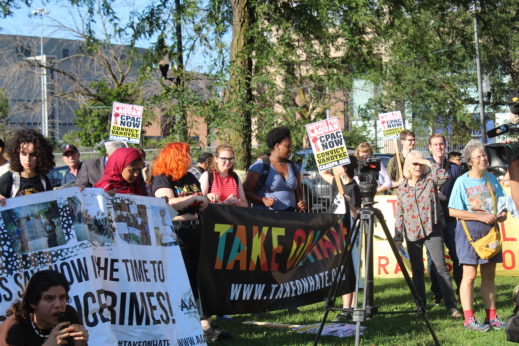
CHICAGO – Hundreds of demonstrators gathered outside of the Cook County Criminal Courthouse Wednesday morning for the first day of the Jason Van Dyke trial. The former police officer is charged with the first-degree murder of 17-year-old Laquan McDonald, an unarmed Black youth who was shot 16 times near 4100 South Pulaski Road, Oct. 20, 2014.
The news of McDonald’s death made national headlines after a freelance journalist, Brandon Smith, sued the City of Chicago to obtain dashcam video of the incident. The graphic footage sent shockwaves throughout the city. Activists and community members shut down the Magnificent Mile in the days following the video’s release. It was one of Chicago’s largest protests in recent years.
Now, four years later, the McDonald family is finally seeing some semblance of accountability, with Van Dyke’s case marking the first time in nearly 35 years that a Chicago police officer has been charged with first-degree murder for an on-duty fatality. Demonstrators withstood the blistering Chicago heat as they waited outside the courthouse chanting and demanding justice for Laquan.
Several political figures spoke during the demonstrations, including Alderman Carlos Ramirez-Rosa of the 35th ward. “If today proves anything, it is that Laquan McDonald rests in power,” said the Alderman as he urged people to mobilize. Rosa has been an outspoken advocate of police accountability measures.
Mayoral candidate Amara Enyia was also in attendance and spoke with People’s World about her own longstanding involvement with the case. Enyia stated that she has been following the case closely since 2014 before it became a national headline. “Today represents many things for organizers, organizations, people in the community who have been calling for this kind of change for years.” The mayoral hopeful says that the most important aspect of her role in the movement is about standing in solidarity with the folks who do the groundwork. “We are all in this together,” says Enyia.

The Chicago chapter of Black Lives Matter was one of the main collectives leading the demonstration Monday morning. Maria Hernandez, one of BLM’s central organizers, spoke with People’s World about the significance of the Van Dyke trial. “We’re fighting for justice for Laquan, and that includes not just this conviction, but the necessary reforms to police, reforms to the city, and to our governmental structure.”
Hernandez has been on the forefront of the fight for more police accountability measures, including the development of CPAC — a Civilian Police Accountability Council. Were CPAC enacted in Chicago, the task force would allow community members to become more involved in matters of police misconduct. “We need to ensure that we put an end to these types of police murders and/or at least have accountability for when it happens.” Proponents of CPAC say it’ll help prevent the type of issues that occurred with McDonald’s case, such as the delayed arrest for police misconduct that occurred under Chicago Mayor Rahm Emanuel’s administration. Activists have also been pushing for the Laquan McDonald Act, a bill that would allow community members the power to recall Chicago’s elected officials.
The trial occurs just a day after Emanuel announced that he would not be seeking re-election. Many blamed Rahm’s administration for its poor handling of the Laquan McDonald case. The mayor had delayed release of the tell-all webcam tapes, and since then activists have called for his resignation. Some said the mayor was quitting because he realized that issues connected with his handling of the Laquan McDonald would consume much of his time during his campaign.
Hernandez says the mayor’s retirement vindicates what the movements for justice in this case are all about. “This validates our work enormously. Rahm knew even with his nearly unlimited amount of campaign funds he could not fight this reality. He has to pay for what has happened.”
One of the more difficult obstacles the courts are facing is making sure that an impartial jury is chosen — especially on a case with this level of national recognition. About 200 potential jurors were reviewed in court on Wednesday and given a questionnaire to help narrow down the pool. A dozen jurors will be ultimately selected and questioned by the judge. There is still a possibility that the case may be moved to outside of city limits, but there has been much public pressure for the trial to remain in Chicago.
In the meantime, organizers say that they will remain outside of the courthouse while the jury selection process continues. Trial proceedings could continue anywhere from several weeks to several months but Hernandez says they have no intention of leaving. “We’ll be out here every day until we get a conviction.”











